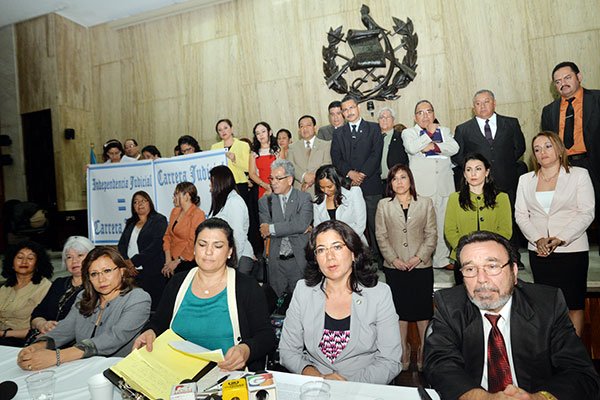Guatemala’s Constitutional Court (CC) has suspended the election of high court magistrates, following outcry from judicial officials over corruption in the selection process — a positive move toward reform, but one that could still be derailed.
Gloria Porras, the interim president of the CC, said in an October 9 press conference that the body would temporarily grant five appeals made for the nullification of the process by civil society organizations and a lawyer, reported Prensa Libre. This decision, which saw just one opposing vote, will suspend the congressional agreements via which 13 Supreme Court and 126 appellate court judges were selected and keep the selected candidates from assuming their posts until the CC has made a final decision.
The decision came just two days after appellate court judge Claudia Escobar Mejia — who recently resigned in protest over the selection process — and 45 other judges claimed they would take action if the CC did not rapidly address the appeals, reported elPeriodico.
That same day, Guatemala’s Human Rights Attorney’s Office (PDH) drafted a formal complaint to be delivered to the Public Ministry (MP – Guatemala’s Attorney General’s Office) regarding eight irregularities observed in the selection process, reported elPeriodico. These included inappropriate selection criteria and failure to verify candidates’ background information.
A day before the CC’s decision, 12 of the recently elected Supreme Court judges launched a counter-attack, demanding that the process not be nullified, reported elPeriodico.
InSight Crime Analysis
The CC’s decision marks an important recognition of the many voices — including the United Nations — that have come out against Guatemala’s broken judicial selection process. However, during the time period in which the court continues to review the appeals (it could reportedly take up to 45 days to reach a final decision), there are plenty of worried people who will likely be working behind the scenes, doing everything in their power to stop the process being done over.
SEE ALSO: The War for Guatemala’s Courts
The difficulty of changing the system is underscored by the fact that one congresswoman presented a legal initiative aimed at reforming Guatemala’s postulation commissions two years ago, but this never moved past Congress.
As noted by InSight Crime, Guatemala’s postulation commissions are heavily influenced by political and business elites looking to protect their interests by maintaining power over the country’s judicial system. These same powerful elites have in the past moved against judicial officials like former Attorney General Claudia Paz y Paz, who posed a threat to their impunity.
In the recent process, two political parties in Congress — which makes the final selections — banded together to choose the judges in an exclusive manner. The selected candidates included a prominent drug trafficker’s lawyer and a judge previously accused of favoring criminals.

